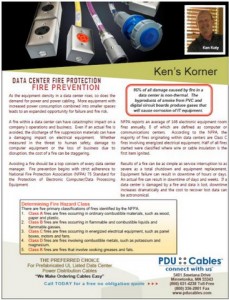KEN'S KORNER - Fire Prevention
Data Center Fire Prevention Tips
As the equipment density in a data center rises, so does the demand for power and power cabling. More equipment with increased power consumption combined into smaller spaces leads to an expanded opportunity for failure and fire risk.
A fire within a data center can have catastrophic impact on a company’s operations and business. Even if an actual fire is avoided, the discharge of fire suppression materials can have a damaging impact on electrical equipment. Whether measured in the threat to human safety, damage to computer equipment or the loss of business due to disruption, the cost of a fire can be staggering.
95% of all damage caused by fire in a data center is non-thermal. The byproducts of smoke from PVC and digital circuit boards produce gases that will cause corrosion of IT equipment.
Avoiding a fire should be a top concern of every data center manager. Fire prevention begins with strict adherence to National Fire Protection Association (NFPA) 75 Standard for the Protection of Electronic Computer/Data Processing Equipment.
NFPA reports an average of 146 electronic equipment room fires annually, eight of which are defined as computer or communications centers. According to the NFPA, the majority of fires originating within data centers are Class C fires involving energized electrical equipment. Half of all fires started were classified where wire or cable insulation is the first item ignited.
Following are some fire prevention points that should be considered in the design and maintenance of a data center and associated areas.
• The construction of the data center should be comprised of fire rated, flame retardant and heat resistant materials including, floor, sub-floor, walls, ceiling, drop-ceiling, doors and windows.
• Be aware of the need for all finishes used on floors, walls and ceilings to satisfy code requirements.
• A raised floor that is installed over the structural floor should be constructed of noncombustible or fire-retardant materials.
• All cable cutouts in floor panels should have edges protected with clips or grommets to avoid damage to the cables.
• Utilize a “breakdown room” or “staging area” where equipment is unpacked and assembled prior to installation into the data center.
• Combustible materials should be avoided in the data center. Limit storage of supplies to a bare minimum and remove packing materials and other unnecessary items from site as quickly as possible.
• Anything, including supplies that are required in the data center should be stored in fire retardant boxes or cabinets.
• Class B flammable and combustible liquids should not be stored in the data center, and include oil, oil based paint, petroleum, gasoline and flammable solvents.
• Periodically inspect for breaches in the data center’s perimeter. External sources of smoke and other particulate can trigger a sensitive alarm or suppression system discharge within the data center with catastrophic impact.
• Fire suppression systems are an important part of new data center designs, but only effective if a fire starts inside the data center. Fires that start somewhere else and move can leave a data center vulnerable.
• Perform regular inspections and service all firefighting systems and equipment to ensure they are operational.
• Check and clean coils on the air conditioner periodically, especially if left idle for a period of time. If dust is allowed to collect, it may smolder or ignite when the unit is turned on.
• Most importantly walk the floor. Use sight, sound and smell to detect potential problems before they trigger a suppression system.
• Be on the lookout for equipment failure, out of capacity equipment, increased power consumption, spikes in temperature, electrical panel hot spots, worn bearings in fan motors and water leakage. Anything that can contribute to equipment failure can lead to a possible fire.
Results of a fire can be as simple as a service interruption to as severe as a total shutdown and equipment replacement. Equipment failure can result in downtime of hours or days. An actual fire can result in downtime of days and weeks. If a data center is damaged by a fire and data is lost, downtime increases dramatically and the cost to recover lost data can be astronomical.
Ken Koty,

